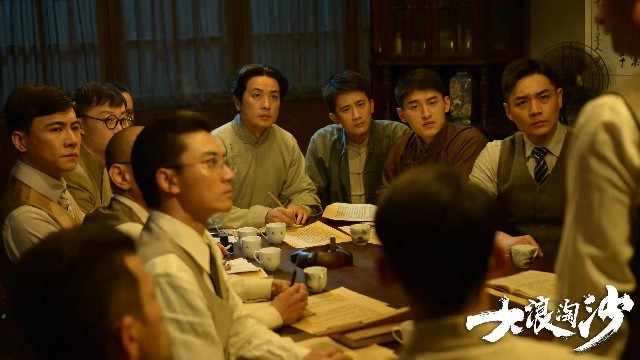TV Series Documenting CPC's Historic Moment Creates Waves

The TV series traces the respective life paths of the 13 delegates of Communist Party of China's First National Congress. [Photo provided to chinadaily.com.cn]
As this year marks the 100th anniversary of the founding of the Communist Party of China, a number of TV series and movies are treating the early revolutionary history - especially the Party's first National Congress - as the subject.
The 40-episode TV series Da Lang Tao Sha (great waves sweep away sand) set from 1919 to 1945 traces the respective life paths of the 13 delegates who attended the CPC's first National Congress, which was held in Shanghai and Zhejiang province’s Jiaxing, from July 23 to 31, 1921.
A recent symposium organized by China TV Artists Association was held in Beijing to draw major creators and experts to discuss the production’s storytelling, character shaping and artistic innovation.
Ethnic Kazakh director Jana Shah said the production marks the creators' endeavor to depict an ensemble of figures.
"The history is created by people and we have tried to tell the history through various perspectives," said Shah.

A still image of the revolutionary TV series Da Lang Tao Sha (great waves sweep away sand). [Photo provided to chinadaily.com.cn]
The TV series was shot in more than 600 film settings. Besides, some replicas of significant sites in the CPC history - ranging from the "South Lake Red Boat" in Jiaxing and house caves in Yan’an, Shaanxi province, - were constructed to reflect the historical reality.
Li Zhun, former deputy chairman of China Federation of Literary and Art Circles, said that the TV series has injected freshness to the genre of revolutionary series, which have flooded across the country's TV screens and cinemas this year.
"The series vividly reflects the 13 delegates' different options in different historical moments, which have been barely featured in previous TV dramas," added Li.
The TV series started to run on Zhejiang Satellite TV and Jiangsu Satellite TV from May 21, and is still available on mainstream streaming sites including Youku and iQiyi.
